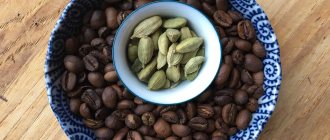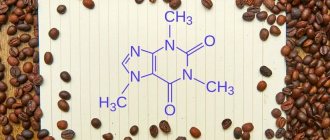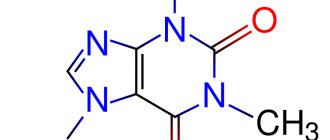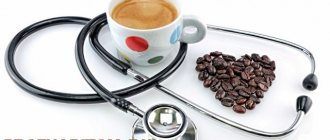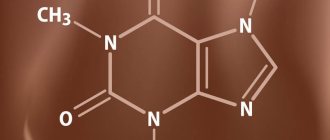Effect on the cardiovascular system
The effect of coffee on the human body is caused by the presence of active substances in coffee beans: caffeine, theobromine, trigonelline, chlorogenic acid and mineral salts. The main effect of the drink is realized with the help of caffeine.
Caffeine is an alkaloid that is present in cocoa beans, tea leaves and guarana (part of Coca-Cola). The effect of the substance is due to the blocking of the phosphodiesterase enzyme in the blood plasma, adenosine receptors in the central nervous system and the direct effect of metabolites on the vascular endothelium.
The enzyme phosphodiesterase breaks down the energy molecules (cAMP) of muscle fibers. Disruption of the process is accompanied by the accumulation of calcium ions and energy in the muscles of the vascular wall involved in contraction.
The negative effect of coffee drink on the heart is caused by widespread spasm of the coronary vessels. The linear and volumetric velocity of blood flow through the narrowed lumen decreases, so oxygen starvation of the heart muscle occurs.
The direct effect of caffeine on the endothelial layer of the vascular wall causes a lightning-fast spasm of the capillaries, after which pronounced vasodilation occurs (expansion of the lumen).
Negative effects of the drink: why is coffee dangerous for human blood vessels?
People who drink more than two cups of the drink daily note periodic increased and rapid heartbeat, increased blood pressure, and chest pain. These symptoms are characteristic of ischemic damage to the heart muscle.
The discrepancy between the delivery and myocardial oxygen demand occurs due to a narrowing of the lumen of the coronary vessels. The harmful effect of coffee on the functional state of the heart is realized by the following mechanisms:
- a prolonged increase in systemic blood pressure increases the load on the left side of the heart, resulting in hypertrophy (increase in size) of the myocardium;
- Coffee as a cause of heart pain is considered from the point of view of metabolic disorders in the heart muscle. An increase in organ size is accompanied by an increase in the need for nutrients. Spasm of the coronary vessels interferes with normal blood flow, so metabolic processes are disrupted in the heart and toxic metabolites accumulate. The latter affect the nerve endings, causing sensations of pain behind the sternum;
- an increase in the frequency and force of myocardial contraction develops as a result of the body’s compensatory reaction to the action of a harmful factor.
However, the sensitivity of human receptors to caffeine depends on genetic predisposition, age, and general somatic condition. Therefore, the question of whether the cause of pain in the heart can appear from coffee is decided after examining the patient by a cardiologist, neurologist and other specialists.
The effects of coffee alkaloids are realized not only in relation to the heart muscle, but also in other organs. The drink’s harm to the heart and blood vessels is explained by its effect on structures through impaired blood flow.
The vascular wall of the arteries consists of three layers:
- intima (internal), lined with flat endothelial cells. Long-term coffee consumption disrupts the structure of the layer, developing blood clots and atherosclerotic plaques;
- media (middle) - consists of muscle fibers, the contraction of which narrows the lumen of blood vessels. The sensitivity of this layer to caffeine depends on the elasticity of the threads. Old age, lipid metabolism disorders, systemic diseases reduce the ability of the vascular wall to return to normal;
- adventitia (external) – connective tissue membrane.
One of the structures most sensitive to changes in blood flow is the brain. The functioning of cortical neurons is directly dependent on glucose. Diffuse narrowing of the lumen of the cerebral arteries due to blocking of phosphodiesterase reduces the speed of blood movement, resulting in starvation of the nervous tissue.
Blockade of adenosine receptors causes the opposite effect: caffeine dilates blood vessels, increases wall permeability and intracranial pressure. Both mechanisms provoke headaches, fatigue, dizziness and insomnia.
Instant or decaffeinated coffee at low pressure
Is it possible to drink coffee with low blood pressure if it does not contain caffeine? You can, but it will not have a tonic effect. You can drink the drink just for company or for the sake of taste. To achieve a cheerful state, hypotensive people need natural caffeine contained in any drinks - green tea, guarana, mate.
Eleutherococcus, rose hips, hawthorn, cinnamon, and ginseng are also suitable. To help yourself urgently if your health has suddenly deteriorated, you need to keep with you one of the options to replace coffee with low blood pressure.
Particular attention should be paid to soluble varieties, especially cheap analogues. To make a person feel a surge of strength and good mood, artificially synthesized caffeine is often added to the granules.
The drink can help temporarily eliminate negative symptoms, but natural grains will make it softer and safer. After artificial analogues, the body's reaction can be unpredictable, so it is better not to take risks when away from home.
Consequences of overuse
Israeli scientists conducted an experiment to study the effect of caffeine on blood pressure. The study revealed that a single dose of 200 mg of the substance (equal to double espresso) causes an increase in readings by 4-6 mm Hg. Art. only in people with diseases of the cardiovascular system.
Damage to the body caused by caffeine appears after prolonged consumption of more than five cups of coffee per day and is characterized by:
- Frequent headaches in the forehead or back of the head. The localization of the pain syndrome is associated with the level of blood pressure.
- Insomnia. The general nervous state is caused by the exhaustion of adaptation systems. The body is able to compensate for the constant stimulation of functions in the nervous system for a long time. However, prolonged wakefulness with increased mental and physical stress is accompanied by the accumulation of toxic metabolites. At the same time, the problem of chronic fatigue is associated with depletion of the depot of essential nutrients and biologically active substances.
- Periodic disruption of blood transport through the coronary vessels (accompanied by a disorder of the contractile and conductive functions of the heart). The automaticity of synthesis and conduction of impulses is ensured by the isolated structure of nerve nodes and fibers that are affected by myocardial pathologies. Arrhythmia (disturbance in the normal rhythm of the heart), manifested by atrial fibrillation, the appearance of extrasystoles (extraordinary contractions) and blockades, is a sign of chronic coffee abuse.
In addition, caffeine is one of the stimulant substances that can cause addiction. If coffee is consumed by people with a habit, their general condition improves, while in abstinence (abstinence) they experience symptoms of headache, nausea and fatigue.
What types of grains affect hypotensive patients?
The natural caffeine content in Arabica is lower than in Robusta, therefore, to make the process of stimulating the body and blood vessels more gentle, it is recommended to brew Arabica. Robusta contains twice as much caffeine, so its hypertensive properties will be more pronounced.
In this case, there is a danger that after the end of the action of the alkaloid, a drop in pressure will occur, which may drop even lower than at the initial levels. For information, blood pressure is considered low : 60/90 Hg. To prevent this from happening, Robusta must be drunk as an Americano or brewed with a smaller amount of ground beans.
Green grains work best. They do not cause negative symptoms in the gastrointestinal tract. There is more caffeine and useful substances - vitamins, minerals, since the grains are not subjected to heat treatment at high temperatures, therefore, chemical compounds are not destroyed.
Green coffee beans can be drunk at low blood pressure 3 to 5 times a day to maintain performance. Natural, unroasted varieties of grains have a strong diuretic effect, so dehydration occurs faster.
In order not to upset the balance of fluids and electrolytes in the body, you need to maintain a water regime: before drinking green espresso, it is recommended to drink at least 0.5 liters of pure still water. In total, a person with hypotension should drink up to 2 liters of water per day, not counting the liquid in food, juices, compotes, and first courses.
In what cases is coffee intake limited?
Periodic consumption of the drink and other products containing caffeine does not pose a threat to human health. However, systemic exposure to the active substance causes the presence of contraindications:
- Pregnancy - intrauterine development of the fetus depends on the adequacy of the delivery of nutrients through the placenta with the mother's blood. With frequent consumption of coffee and regular spasm of all blood vessels, fetal hypoxia occurs - the cause of congenital pathologies.
- Systemic atherosclerosis in older people - when exposed to caffeine, a vessel affected by atherosclerosis contracts, a plaque ruptures and a free particle (embolus) enters the bloodstream. The most dangerous consequence of embolism is blockage of the arteries of the brain (ischemic stroke) or coronary vessels (myocardial infarction).
- Angina pectoris (pain behind the sternum) is a symptom of ischemic myocardial damage. The chain between heart pain and coffee is realized through an additional spasm of damaged blood vessels after drinking the drink.
- Hyperacid gastritis and gastric ulcer - caffeine stimulates the secretion of hydrochloric acid in the organ, which has a destructive effect on the mucous membrane. Discomfort and pain in the upper abdomen are characteristic symptoms of gastropathy.
Caffeine overdose with decreased tone
Even hypotensive people can overdose on caffeine, so caution should be exercised and the number of servings per day should be strictly controlled. Symptoms of excess caffeine intake:
- acceleration of heart rate - tachycardia;
- trembling of limbs;
- dizziness or loss of consciousness;
- nausea, in case of severe poisoning - vomiting.
Symptoms of poisoning can be eliminated on your own by drinking about a liter of water. This will gradually reduce the concentration of caffeine in the blood and help eliminate it through the kidneys.
Results
Natural coffee beans do not cause pathological reactions in healthy people. The content of natural stimulating alkaloids, vitamins (PP) and minerals does not disrupt the functioning of organs and systems, while the instant drink contains a large amount of stabilizers and chemical flavors, after consumption of which the risk of deterioration of the general condition increases.
For people with various diseases and contraindications to caffeine consumption, the market offers a special coffee drink without alkaloids. The decaffeinated one does not differ in taste and smell from the regular one, but does not trigger a cascade of reactions in the body’s regulatory systems. There is no clear answer as to whether coffee is harmful to blood vessels and the heart. The effect of caffeine on the cardiovascular system is determined by the individual characteristics of a particular person and the properties of the drink itself.


